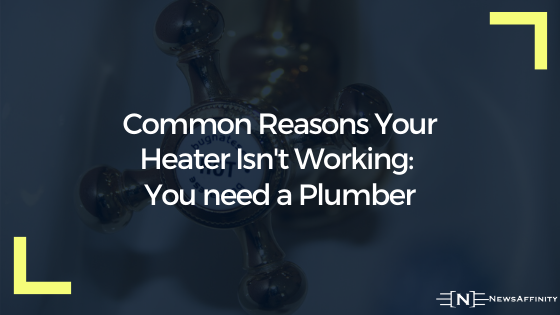Hot water is so part of our daily lives that most of the time we don’t even think about it, that is until it stops working. When the hot water goes out it can cause all kinds of chaos. Cold showers are a shock at the best of times but in winter it is not really an option. Here are some of the main reasons that your hot water heater may have stopped working with a bit of luck you will be able to fix it yourself and will not need to call a plumber to fix it at great expense.
1. Out of Gas or No Electricity
If you have noticed that your water heater is not working or giving enough hot water, a simple reason and cause would be either no electricity supplied to the heater, or gas to heat the water. Other common problems that may be afflicting the water heater being an unplugged or faulty power cord for electric water heaters.
Additionally, if you have an electric water heater, they are equipped with a circuit-style safety switch that is located near the thermostat on the water heater; for gas water heaters, it may something minute that has an easy fix; like running out of gas.
2. Electronic Ignition
The gas electronic-ignition system has been implemented in numerous appliances around the home, such as boilers; it is safe and reliable. However, an electronic ignition system for gas water heaters uses a solid-state circuit that both controls flame ignition.
These ignition systems do not use a thermopile or thermocouple to provide a flame for the water heater, but instead, provide a sensor to determine the voltage levels. If this sensor becomes clogged or faulty, it can stop the voltage-current from being read by the control sensor. This is generally easy to fix, and the sensor will start to work again by being cleaned.
3. Pilot Light
Similar to a heater that is used to provide your home with warmth, water heaters have what is called a pilot light, and needs to stay on for the unit to work properly. If this goes out, it will prevent gas from reaching the burners thus rendering your water heater inoperable.
Sometimes the pilot light can go out if the thermocouple of thermopile fails, but that is not the only cause that can make the pilot light go out. These are sometimes temperamental, and something small like a draft or a breeze can cause it to go out before being relit. Sometimes, the gas valve will deteriorate and lose durability with time and use; needing to be replaced additionally.
4. Thermostat
Although issues with thermostats are rarer than other elements of your water heater, they do occur and can be difficult to diagnose. If your water heater is not functioning adequately, the thermostat would be one of the first things that are looked at. For instance, in single-element water heaters, if the thermostat is not working, there will no water at all; while in tow-element water heaters will usually have a thermostat per each element.
The thermostat that is found at the top of the unit reroutes power to the one that is found on the bottom if it finds that the water in the top region of the tank is too hot. If the lower thermostat is malfunctioning, you will still receive a small amount of hot water. However, if the top thermostat is not functioning, you will not have any hot water at all (remember this is what signals to the lower thermostat to begin heating water).
A faulty thermostat can be identified by the high-limit switch going out often.
5. Temperature and Pressure-Relief Valve (TPR)
The temperature and pressure relief valve is a safety feature that is designed to relieve pressure if the inside water of the heater becomes heated to high. Due to the layout of these water heater parts, if this valve is not working properly or was not installed correctly, the water heater could explode due to pressure; this could lead to harm to yourself and/or damage to your property.
If this valve is not properly working in any way, it should be replaced as soon as you are able. Additionally, it is very important to note that this valve should never be capped off, as this would entail dangerous amounts of pressure building up in the water heater too.
To enable both this component and the water heater to function properly, it would be wise to have them diagnosed yearly to foresee any issues there might be.
6. Water Pressure Loss
Water pressure loss is another common issue that water heaters can have that will keep them from working properly. There are several reasons why water heaters can lose water pressure, and as we learned above the TPR (Temperature and Pressure Release Valve) will open to release some of the pressure if it gets too high in the water heater.
If attached to the water main and there is not a TPR, then the excess water will most likely re-enter back into the water main, which can cause a leak.
Another additional possibility for water pressure loss is that the municipality or institution in charge of water has risen above the TPR set range; in which case installing a tank for expansion can help to alleviate or resolve the problem. That said, any substantial increase in the water pressure can still cause a leak, as it forces the TPR valve to open. Other reasons for a loss of water pressure are:
- adjacent water line(s)
- loose heating element bolts
- connections and fittings not being fit or tightened correctly
By lowering the settings of the thermostat, the water pressure can be reduced, and you can try to flush the system by opening the TPR valve (just make sure to have a bucket underneath or something to catch the water).
7. Loose Parts
Like anything that has components, parts that are not secured properly can have a determining factor in the water heater not working properly. Sometimes making sure that everything is in place and adequately tightened will help to remove or lessen any problems that you may be experiencing.
However, if you notice that the water heater is leaking from the bottom it may be from a bad gasket, or the water heater itself leaks it. At this point, it may be time to call in a professional. While you can tackle some issues on your own when it comes to a leaky unit you will want to put your mind at ease and have a professional opinion and fix.
Conclusion
I hope that you could save some money and fix your hot water system issue by yourself and did not need to call a plumber. Plumbers can be expensive but worth the cost if it is not an easy DIY fix.

















Comments